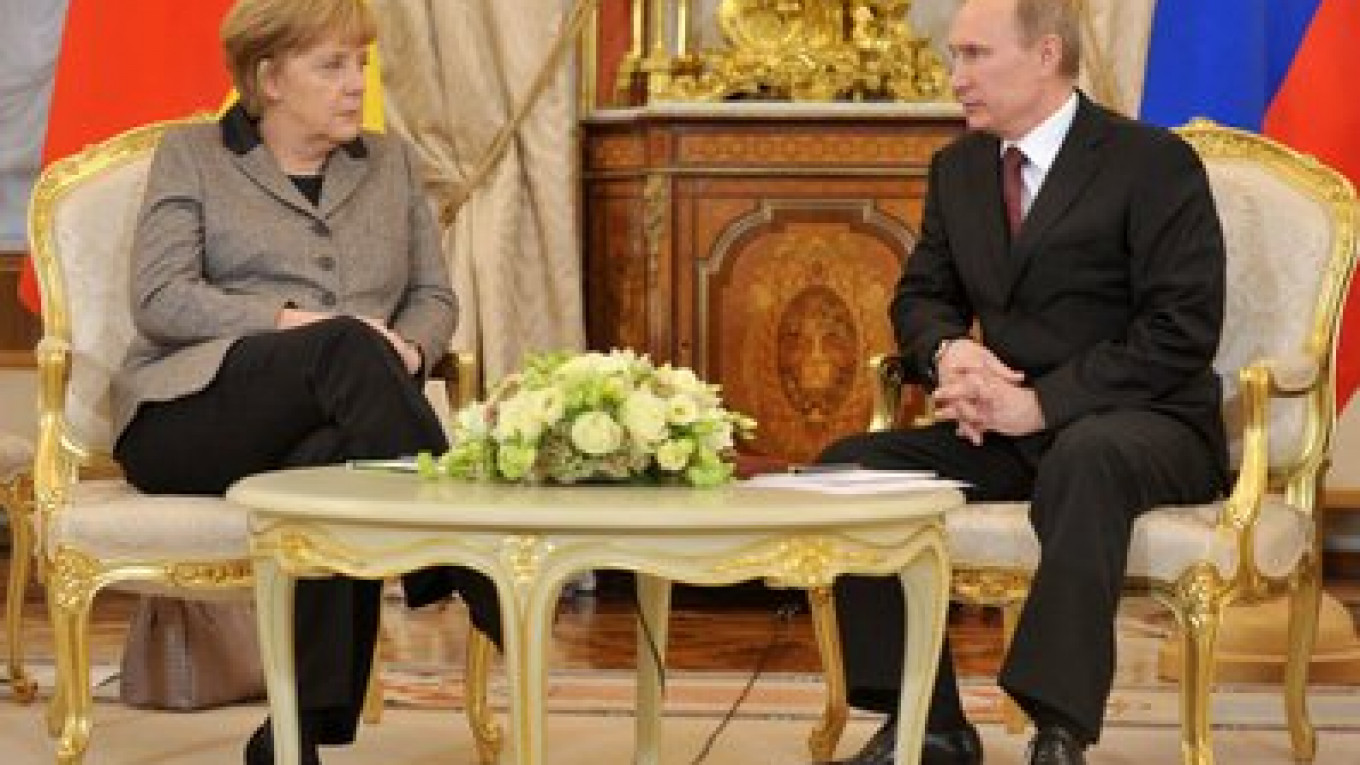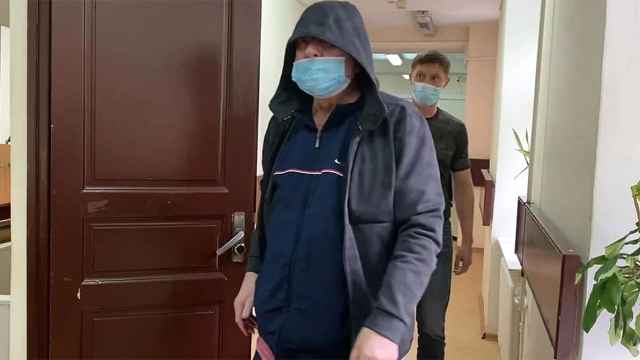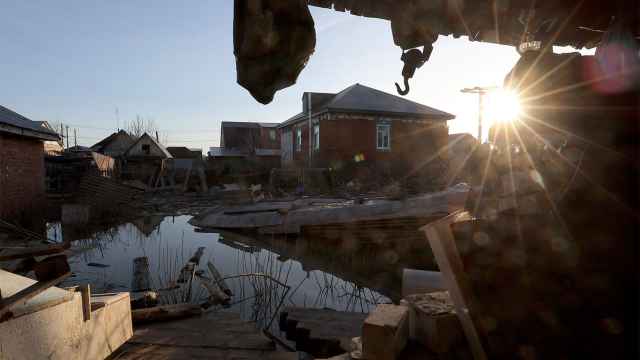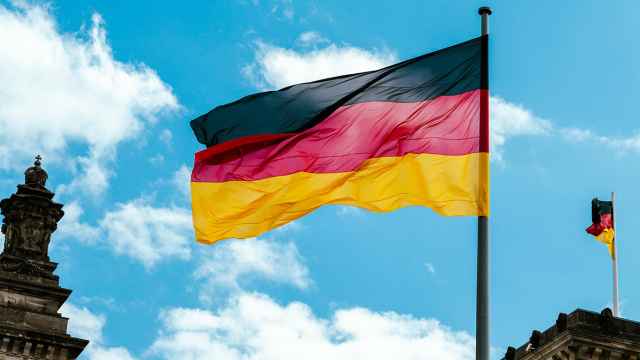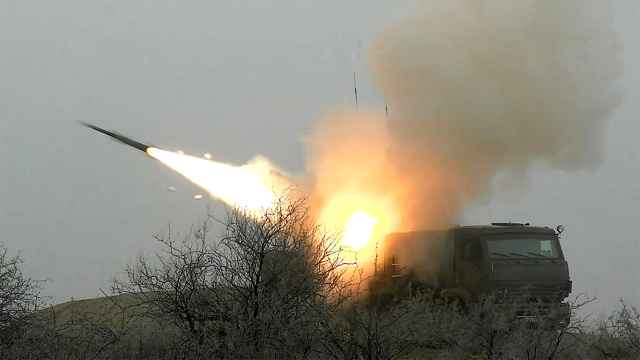President Vladimir Putin and German Chancellor Angela Merkel traded barbs over Pussy Riot, human rights and democracy during Kremlin talks Friday that marked a turn in Berlin's policy toward Moscow.
Merkel, who had been under pressure not to be soft on Putin, seemingly enjoyed confronting her host about the ongoing onslaught on the opposition.
During an at times fulminant panel debate in the Kremlin, she said that a series of recently passed legislation curtailed freedom and that the two-year prison sentences for Pussy Riot activists were too harsh.
A jovial Putin played down the criticism, saying the country's partners hear about events in Russia "from far away." He created fresh controversy by telling Merkel that the Pussy Riot members deserved no sympathy because they supported anti-Semitic positions.
The president claimed that one of the young women had hanged an effigy of a Jew in a city shopping mall and said "Moscow needs to get rid of such people."
Bloggers quickly pointed out that this resembled a 2008 performance by the Voina radical art group, in which, however, no effigies but five volunteers were mock-hanged in a supermarket to criticize City Hall's policies toward migrants and gays. And while two known Pussy Riot members did take part, their trial and sentencing this summer had nothing to do with that performance but solely with their singing in a Moscow cathedral this February.
Putin, however, insisted on his version during a news conference hours later. "They hanged in a Moscow supermarket three effigies labeled Jew, immigrant and another category, with the call to rid Moscow of these people. I believe this is a direct anti-Semitic insult," he said.
The president also left listeners baffled by telling Merkel during the panel debate that Germany had been criticized by human rights groups because five of its states lacked a "law for the protection of information."
Germany does have data protection laws in each of its 16 states and at the federal level. However, only nine states have freedom of information laws that guarantee citizens access to state documents. Observers quickly pointed out that Russia has no such law.
Merkel, who appeared relaxed and at times smug during the debate, which marked the end of the Petersburg Dialogue, an annual Russian-German forum, also suggested that her hosts could not deal with criticism. "If I were sulky every time I'm criticized, I wouldn't last three days as chancellor," she said.
Putin's spokesman Dmitry Peskov said last week that it was useless to talk with the Kremlin's critics in Berlin, calling them "hotheads" who were not among the friends of Russia.
Tension had been rising between Berlin and Moscow during past months, as German lawmakers prepared a highly critical report about the worsening opposition crackdown in Russia, which the Bundestag passed by a majority Nov. 9.
While Berlin has traditionally been one of Moscow's staunchest supporters in the West, Merkel has recently faced strong calls from inside her ruling center-right collation for a more critical approach.
Unlike her predecessor Gerhard Schröder, who today heads the North Stream pipeline consortium, Merkel never established warm personal ties with Putin, but was said to get along very well with Dmitry Medvedev during his four-year stint in the Kremlin, which ended in May.
Her pragmatic course of wielding a "modernization partnership" with Moscow has been questioned since Putin's return to the presidency, and Merkel has been criticized by investing too much hope in Medvedev.
However, Merkel stressed on Friday that Berlin would continue its cooperation with Moscow — by pointing to the annual talks between Cabinet ministers from both governments, which also took place Friday in the Kremlin, and to the fact that more than 6,000 German companies are operating in the country.
Germany is Russia's second-largest trading partner after China, and bilateral trade is expected to peak at $102 billion this year.
Ministers and business leaders from both sides signed 10 new cooperation agreements Friday, including a letter of intent between technology giant Siemens and Russian Railways to purchase nearly 700 trains for about $3.2 billion.
During the signing ceremony, Merkel and Putin seemed relaxed and cordial, chatting freely with each other. Putin, who served five years in Dresden for the KGB, speaks fluent German, while Merkel, who is from East Germany, studied Russian in school.
The president even surprised his German guest with outright flattery. When Merkel remarked that mutual criticism does not hurt ties because "there is no model Russian and no model German," Putin quipped that, "for us, there is such a German — Ms. Federal Chancellor."
However, Putin also offered some trademark bluntness. When Merkel said Germany always tried to agree on foreign policy with the other European Union members, he did not hide his dislike for the 27-member bloc by likening it to a "cartel." "You need to have your own position," he said.
Minutes later, Merkel seemed to respond by remarking that "I tell you no secret that your president pulls no punches when he dislikes something."
The president also reiterated his opposition to the EU's so-called third energy package, which would restrict Gazprom's control over its European pipeline assets, by calling it "harmful" and warning the European Commission that it would violate international law if it its adoption would lead to a retroactive implementation.
On a more positive note, he said he hoped that the EU would solve its ongoing debt crisis and he supported Merkel's strategy of tackling it.
At the very end of Friday's news conference, he prompted laughter by proposing that in order to deepen "strategic interaction," Germany's national football team should play for Russia — and Russia's team for Germany — in the 2018 World Cup, which will be held in Russia.
"Mr. Westerwelle waved his arms, and I do not know if that was because of joy or anger," he quipped at German Foreign Minister Guido Westerwelle, sitting in front of him.
Merkel only dryly responded that she had not approved any such agreement.
Related articles:



